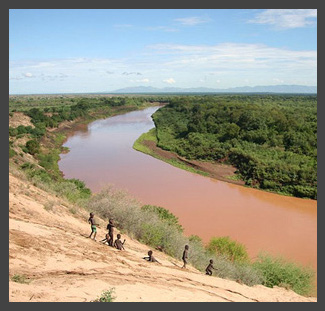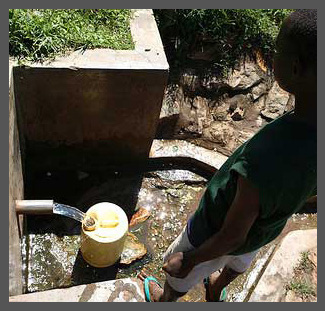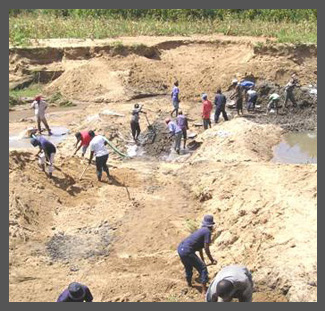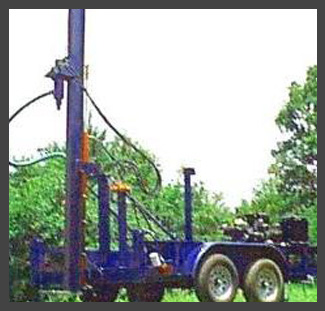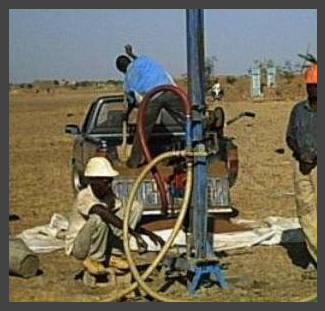Difference between revisions of "獲取地下水"
From Akvopedia
| (10 intermediate revisions by 2 users not shown) | |||
| Line 1: | Line 1: | ||
| − | {{Language-box|english_link=Groundwater access |french_link=L'accès aux eaux souterraines |spanish_link=Coming soon|hindi_link=Coming soon|malayalam_link=Coming soon|tamil_link=Coming soon | korean_link=Coming soon | chinese_link= | + | {{Language-box|english_link=Groundwater access |french_link=L'accès aux eaux souterraines |spanish_link=Coming soon|hindi_link=Coming soon|malayalam_link=Coming soon|tamil_link=Coming soon | korean_link=Coming soon | chinese_link=獲取地下水 | indonesian_link=Coming soon | japanese_link= Coming soon}} |
雨水如能順利入滲,最終即成為地下水。收集地下水是件有利的做法,因其不論雨季隨時可得、普遍來說有著高貯水容量及優良水質、對於年際氣候的適應力高、以及與替代來源相較之下擁有較低成本。 | 雨水如能順利入滲,最終即成為地下水。收集地下水是件有利的做法,因其不論雨季隨時可得、普遍來說有著高貯水容量及優良水質、對於年際氣候的適應力高、以及與替代來源相較之下擁有較低成本。 | ||
| Line 14: | Line 14: | ||
|- | |- | ||
|style="background:#efefef;"|[[Image:riverbed infiltration galleries small.jpg|center|100px|link=河床集水廊道]] | |style="background:#efefef;"|[[Image:riverbed infiltration galleries small.jpg|center|100px|link=河床集水廊道]] | ||
| − | |style="background:#efefef;"|[[Image:SpringwaterCollecting small.jpg|center|100px|link= | + | |style="background:#efefef;"|[[Image:SpringwaterCollecting small.jpg|center|100px|link=泉水收集]] |
| − | |style="background:#efefef;"|[[Image:Subsurface harvesting systems small.jpg|center|100px|link= | + | |style="background:#efefef;"|[[Image:Subsurface harvesting systems small.jpg|center|100px|link=地下水收集系統]] |
| − | |style="background:#efefef;"|[[Image:Small rotary machines small.jpg|center|100px|link= | + | |style="background:#efefef;"|[[Image:Small rotary machines small.jpg|center|100px|link=小型迴旋機]] |
| − | |style="background:#efefef;"|[[Image:Jetting - Engine powered rotary jetting small.jpg|center|100px|link= | + | |style="background:#efefef;"|[[Image:Jetting - Engine powered rotary jetting small.jpg|center|100px|link=噴射沖洗-引擎動力迴旋噴射沖洗]] |
|- | |- | ||
|style="background:#efefef;"|<div class="center" style="width:auto; margin-left:auto; margin-right:auto;">[[Riverbed infiltration galleries|河床集水廊道]]</div> | |style="background:#efefef;"|<div class="center" style="width:auto; margin-left:auto; margin-right:auto;">[[Riverbed infiltration galleries|河床集水廊道]]</div> | ||
| − | |style="background:#efefef;"|<div class="center" style="width:auto; margin-left:auto; margin-right:auto;">[[Springwater collection| | + | |style="background:#efefef;"|<div class="center" style="width:auto; margin-left:auto; margin-right:auto;">[[Springwater collection|泉水收集]]</div> |
| − | |style="background:#efefef;"|<div class="center" style="width:auto; margin-left:auto; margin-right:auto;">[[Subsurface harvesting systems| | + | |style="background:#efefef;"|<div class="center" style="width:auto; margin-left:auto; margin-right:auto;">[[Subsurface harvesting systems|地下水收集系統]]</div> |
| − | |style="background:#efefef;"|<div class="center" style="width:auto; margin-left:auto; margin-right:auto;">[[Small rotary machines| | + | |style="background:#efefef;"|<div class="center" style="width:auto; margin-left:auto; margin-right:auto;">[[Small rotary machines|小型迴旋機]]</div> |
| − | |style="background:#efefef;"|<div class="center" style="width:auto; margin-left:auto; margin-right:auto;">[[Jetting - Engine powered rotary jetting| | + | |style="background:#efefef;"|<div class="center" style="width:auto; margin-left:auto; margin-right:auto;">[[Jetting - Engine powered rotary jetting|噴射沖洗-<br>引擎動力迴旋噴射沖洗]]</div> |
|- | |- | ||
|colspan="5" style="background-color:#efefef;"| | |colspan="5" style="background-color:#efefef;"| | ||
| Line 30: | Line 30: | ||
<br> | <br> | ||
| − | === | + | ===實地經驗=== |
<br> | <br> | ||
{|style="border: 2px solid #e0e0e0; width: 20%; text-align: justify; background-color: #e9f5fd;" cellpadding="2" | {|style="border: 2px solid #e0e0e0; width: 20%; text-align: justify; background-color: #e9f5fd;" cellpadding="2" | ||
| Line 38: | Line 38: | ||
<!--project blocks here--> | <!--project blocks here--> | ||
|- style="vertical-align: bottom" | |- style="vertical-align: bottom" | ||
| − | |[[Image:project 473.jpg |thumb|center|140px|<font size="2"><center>[http://rsr.akvo.org/project/473/ RSR | + | |[[Image:project 473.jpg |thumb|center|140px|<font size="2"><center>[http://rsr.akvo.org/project/473/ RSR 473計畫]<br>Water4Tomorrow計畫</center></font>|link=http://rsr.akvo.org/project/473/ ]] |
|} | |} | ||
<br> | <br> | ||
| − | === | + | ===地下水連結=== |
| − | * [[Sustainable Sanitation & Groundwater Protection]] | + | * [[Sustainable Sanitation & Groundwater Protection|永續環境衛生 & 地下水保護]] |
| − | * [http://www.indiawaterportal.org/articles/key-successfully-managing-groundwater-india | + | * [http://www.indiawaterportal.org/articles/key-successfully-managing-groundwater-india • 成功處理印度地下水的關鍵] |
| − | * [http://www.nwp.nl/_docs/Smart-solutions- | + | * [http://www.nwp.nl/_docs/Smart-solutions-3R聰明解決方案(3R:補給、保持、重複使用)] |
| − | * <font size="3">[http://www.bgs.ac.uk/africagroundwateratlas/index.cfm | + | * <font size="3">[http://www.bgs.ac.uk/africagroundwateratlas/index.cfm 非洲地下水文獻資料庫]</font>:此資料庫包含出版及未出版的報告、期刊文章、 會議論文及地圖,為一有搜尋功能的非洲地下水文獻數據庫。多數的文件可免費下載;其餘則提供線上摘要的連結。對於在線取得性不明之文件則給予完整的參考書目出處。 |
| − | * | + | * 影片:[http://www.thewaterchannel.tv/en/videos/categories/displayresults/0?pattern=manual%20drilling&rpp=10&sort=0&ep=&ex= 多項手動鑽鑿影片]。 由聯合國國際兒童緊急救援基金會提供。 |
| − | * Arjen van der Wal, [http://www.unicef.org/wash/files/04.pdf | + | * Arjen van der Wal, [http://www.unicef.org/wash/files/04.pdf 瞭解手動鑽鑿地下水 & 水井: 提供手動鑽鑿小組作為水井鑽鑿、設置及開發的水文地質學操作指南]。Practica Foundation。2010年六月(第二版)。 法文版:[http://www.practica.org/wp-content/uploads/services/publications/drilling%20manuals/FR/Understanding%20Groundwater%20%26%20Wells%20PRACTICA%20FR%20June%202010.pdf CONNAISSANCES DES METHODES DE CAPTAGE DES EAUX SOUTERRAINES: appliquées aux forages manuels]. |
| − | * [http://www.bgs.ac.uk/research/groundwater/international/africangroundwater/home.html | + | * [http://www.bgs.ac.uk/research/groundwater/international/africangroundwater/home.html 地下水對於非洲氣候的適應力。] Keyworth, Nottingham。英國地質調查所 2011。 |
| − | * [http://www.un-igrac.org/ | + | * [http://www.un-igrac.org/resource/global-overview-saline-groundwater-occurrence-and-genesis-0 地下水鹽化發生及起源之全球概要。] 國際地下水資源評估中心,2009。 |
| − | * [http://www.iaea.org/technicalcooperation/documents/Brochures/sust-groundwater.pdf | + | * [http://www.iaea.org/technicalcooperation/documents/Brochures/sust-groundwater.pdf 南非及西非的地下水資源永續發展。] 國際原子能機構。. |
| − | * [http://www.rural-water-supply.net/en/resources/details/187 | + | * [http://www.rural-water-supply.net/en/resources/details/187 鑽鑿水井選址-專案經理的指南手冊] 農村供水網絡(RWSN)田野筆記 2010-5(成本效益高之鑽孔系列)。Carter, R., Chilton, J., Danert, K. et al. RWSN. St Gallen, Switzerland 2010。 |
<br> | <br> | ||
| − | === | + | ===感謝=== |
| − | * [https://ccafs.cgiar.org/publications/management-groundwater-africa-including-transboundary-aquifers-implications-food#.ViVlZxCrTyI | + | * [https://ccafs.cgiar.org/publications/management-groundwater-africa-including-transboundary-aquifers-implications-food#.ViVlZxCrTyI 非洲地下水管理,含跨界含水層:對於飲食安全、營生及適應氣候改變的可能影響。] 聯合國非洲經濟委員會,非洲氣候政策中心,2011。 |
Latest revision as of 20:11, 26 October 2015
| |
|
|
|
|
|
|
|
|
雨水如能順利入滲,最終即成為地下水。收集地下水是件有利的做法,因其不論雨季隨時可得、普遍來說有著高貯水容量及優良水質、對於年際氣候的適應力高、以及與替代來源相較之下擁有較低成本。
然而,影響地下水位的高度有許多因素:地表面下的土壤及岩石型態、鄰近的蓄水池或河流,及鄰近居民抽水的頻率或總抽取水量。再者,地下水的品質也需納入考量-是否太鹹或太靠近附近的農業逕流或污水區。入滲及抽水地點須設置於水最不會被污染源影響的地方。
氣候變化因素
氣候變化會影響全球降雨量及動態溫度,因而會影響地方社區對於水的供給及需求。普遍認為提升在地面上以及地面下的儲水量是應對水文衝擊(如洪水及乾旱)的策略。
實地經驗
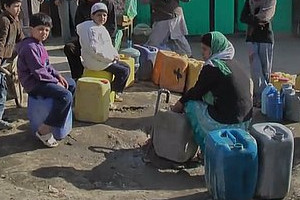 Water4Tomorrow計畫 |
地下水連結
- 永續環境衛生 & 地下水保護
- • 成功處理印度地下水的關鍵
- [1]
- 非洲地下水文獻資料庫:此資料庫包含出版及未出版的報告、期刊文章、 會議論文及地圖,為一有搜尋功能的非洲地下水文獻數據庫。多數的文件可免費下載;其餘則提供線上摘要的連結。對於在線取得性不明之文件則給予完整的參考書目出處。
- 影片:多項手動鑽鑿影片。 由聯合國國際兒童緊急救援基金會提供。
- Arjen van der Wal, 瞭解手動鑽鑿地下水 & 水井: 提供手動鑽鑿小組作為水井鑽鑿、設置及開發的水文地質學操作指南。Practica Foundation。2010年六月(第二版)。 法文版:CONNAISSANCES DES METHODES DE CAPTAGE DES EAUX SOUTERRAINES: appliquées aux forages manuels.
- 地下水對於非洲氣候的適應力。 Keyworth, Nottingham。英國地質調查所 2011。
- 地下水鹽化發生及起源之全球概要。 國際地下水資源評估中心,2009。
- 南非及西非的地下水資源永續發展。 國際原子能機構。.
- 鑽鑿水井選址-專案經理的指南手冊 農村供水網絡(RWSN)田野筆記 2010-5(成本效益高之鑽孔系列)。Carter, R., Chilton, J., Danert, K. et al. RWSN. St Gallen, Switzerland 2010。
感謝
- 非洲地下水管理,含跨界含水層:對於飲食安全、營生及適應氣候改變的可能影響。 聯合國非洲經濟委員會,非洲氣候政策中心,2011。
